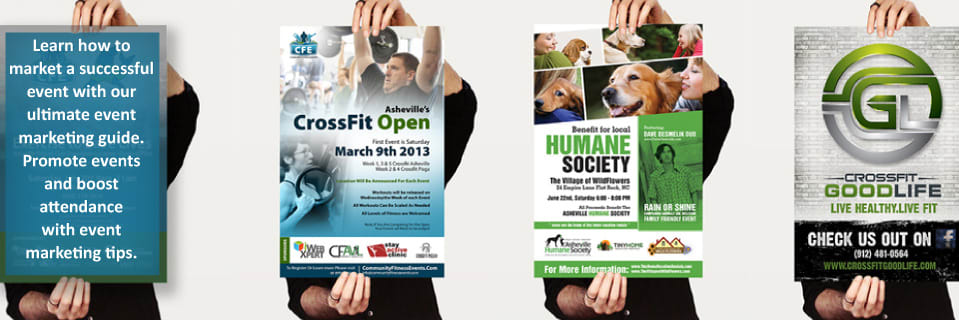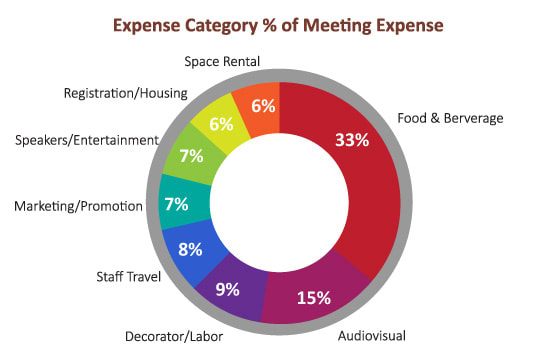- Products
-
Design Templates
- Featured Design Galleries
- More Galleries
- Services & Resources
- Free Sample Kit
- Deals

Whether you’re planning a live concert, holding a 5K race, promoting a fundraiser for your nonprofit organization, or hosting a B2B event such as a trade show or conference, you know event marketing is critical to your success. Events can be major revenue drivers, and it starts with a solid event marketing strategy. Consider these event marketing statistics:
There’s no doubt events mean big money (and brand exposure) for companies and nonprofits alike, but how do you promote an event successfully?
Armed with this guide, you can confidently plan an event marketing strategy that increases attendance, attracts more sponsors, and helps you earn more return on investment for your event. Let’s get started!
Proper planning is the first step toward a successful event marketing campaign. Here’s how to plan your marketing efforts (be sure to check out our before the event checklist and after the event checklist).
Start by setting goals for your event marketing. Pick metrics you can measure to gauge your marketing success. For example:
The number of attendees, which will directly correlate with total revenue and ROI, can’t be measured until after your event. However, it’s important to set those goals now and track other metrics that directly correlate with attendance and ROI. For example, if you meet your event attendance goals in year one and have 2,000 social media shares, the following year you might aim for 3,000 social media shares – which might translate into increased attendance.

Event marketing budgets vary by event. More established events or those that have “cult” followings can get away with smaller budgets, while new events and those that are seeking to grow might need larger budgets.
Some types of events require more marketing than others, too. A live concert featuring a popular band is an easy sell, while a new trade show in a competitive industry will likely take more work and more money to promote.
Either way, your marketing budget should be a set percentage of your overall event budget. Determine the percentage, then you have your marketing budget.
A ]]>survey by the Professional Convention Management Association]]> discovered that the average event marketing budget for events and meetings is 7 percent of the total event budget – but yours could be more or less. A fundraiser 5K, for example, has minimal overhead and might allocate as much as 50 percent of its budget toward marketing.

The best event marketing strategy incorporates a variety of marketing channels, which increases repetition across multiple mediums. The number of marketing channels you choose will depend on your budget. It’s not wise to put all your eggs in one basket, but at the same time you don’t want to dilute your marketing efforts by spreading your budget thin across too many channels.
While your budget will dictate the number of marketing channels you can promote your event in, your audience will dictate which marketing channels you should invest in.
| Direct-mail marketing | Print display ads | Outdoor marketing | Promotional marketing | Online display ads |
|---|---|---|---|---|
| Social media marketing | Search marketing | Email marketing | Media marketing | Publicity/PR |
| Television Radio Magazines Newspapers |
Keep in mind that some marketing channels are great for maximizing exposure – outdoor ads, for example – while others are better at targeting your audience – direct mail. Depending on your audience, you might balance reach and targeting; or, you might opt for one strategy over the other.
For example, if you’re hosting a local fundraiser, outdoor advertising can give you excellent reach with a large audience that’s likely to be interested in your event.If you’re marketing a B2B conference for industrial engineers, however, direct-mail postcards would have a much better chance of success than outdoor advertising.
Carefully consider who your audience is and the best way to reach them to choose your event marketing channels.

It’s important to create an event marketing timeline so you can prepare your marketing tools and schedule them for strategic deployment. You might want to complete this step once you’ve selected your specific marketing tools, but it’s a good idea to keep your timeline in mind as you plan so you can reach the right audience with the right message at the right time.
Create a marketing calendar and decide how you’ll spend your budget within the timeline, which marketing tools you’ll use, and when. You might begin marketing several months out – even as much as a year out – and then ramp up marketing efforts as you get closer to the event date.

Your actual strategy will depend on the nature of your event. Large-scale events such as the Boston Marathon often require attendees to plan ahead: they need to make travel arrangements, book hotels, take time off work, train and qualify for the event. Events such as these should begin marketing very early – even if it’s just a website with the date – so people can begin planning.
Small-scale events such as local fundraisers don’t require as much participant planning, so they can begin marketing closer to the event.
As you create your timeline, you should coordinate your marketing to coincide with major deadlines. If you sell early bird tickets, for example, your marketing spend might surge in the weeks preceding the deadline, then settle to normal until a few weeks before your event.
| 6 months from event date | 5 months from event date | 3 months from event date |
|---|---|---|
|
|
|
| 2 months from event date | 1 month from event date | 2 weeks from event date until event date |
|---|---|---|
|
|
|
Your marketing timeline will likely be different (and it should be more detailed), but this should give you an idea of what an event marketing timeline might look like. It’s also a good idea to list expenses beside each marketing initiative so your budget is spent according to your timeline.
To help plan your event marketing campaign, you can find event marketing strategy templates from the following sources:
The marketing tools you’ll use to promote your event depend on what type of event you’re hosting, where your audience is located, and which channels you’ll use to reach them. The following lists event marketing tools you can consider.
Print marketing is a powerful way to market your event. With print, you can reach the masses with outdoor and print display marketing tools plus reach a well-targeted audience with direct-mailers. Print also creates opportunities for promotional marketing tools and partnerships, which can help you reach a wider, yet targeted, audience. Don’t be afraid to get creative when you print promotional materials for events!

Online marketing is a popular way to promote events and offers the ability to make updates and adjust your budget according to response.

Media outlets such as TV, newspapers, radio stations, podcasts, and magazines can play a huge role in your event promotion. You can take out paid media ads and traditional PR strategies to get earned media mentions.
Remember, multi-channel marketing campaigns have the greatest impact – and repetition is key to success. Don’t be afraid to get creative, either; in fact, sometimes the most creative event marketing ideas work best. Think of creative ways to promote your event, use the event marketing tips listed here to plan a successful campaign, and make your event marketing dollars stretch farther with discount event printing services.